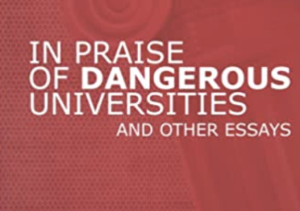A Collection of Sharp and Insightful Challenges to Higher Education in Canada
WINNIPEG, August 4, 2022 – The Frontier Centre for Public Policy has just published In Praise of Dangerous Universities and Other Essays, by philosophy professor Mark Mercer. Universities are abandoning their mission to help students to think for themselves and to produce trust-worthy research and scholarship. Academic freedom, candid discussion, collegial relations and academic standards have been hit hard by speech codes, respectful-campus policies, safe-spaces, preferential hiring, and expanding bureaucratic management. Dr. Mercer criticizes specific cases in which universities have abused academic values and develops general principles to return universities to their academic mission.
In Praise of Dangerous Universities articulates a vision of the university in which professors and students attempt to understand the world through inquiry and critical discussion; it explains what policies and institutional arrangements would best enable them to do so; and it argues that a democratic society of free and equal citizens needs universities that prize their academic mission above all else.
According to Dr. Mercer:
- Universities should not try to be microcosms of our diverse society; they should instead be dedicated to the life of the mind.
- It’s better to live with the problems academic freedom brings than to try to solve them with prohibitions and oversight, for doing so puts university culture at risk.
- Investigating students and professors for what they say or how they say it demeans them, chills discussion, and prevents people from acquiring resilience.
- Decisions regarding admission, hiring, and curricula should be made on academic grounds alone, and not on grounds of equity or diversity.
- Curation and inquiry are both crucial academic projects, but a university loses itself when inquiry does not predominate.
- Academic culture should not be celebratory or affirming of identities but disputatious, irreverent, open, and free.
This engaging collection, written in the thoughtful, civil, and non-partisan style for which Mercer is known, provides a needed antidote to the Diversity, Inclusion, and Equity virus that is turning the true university mission on its head.
Mark Mercer earned his PhD in philosophy from the University of Toronto in 1991. After two years as a post-doctoral fellow at the University of California Berkeley and Simon Fraser University, Dr. Mercer began his teaching career. He is currently a full professor at Saint Mary’s University, in Halifax, where he was Chair of his department for most of the 2010s. He is now in his eighth year as president of the Society for Academic Freedom and Scholarship, an organization devoted to academic freedom and the merit principle in Canadian universities.
In Praise of Dangerous Universities and Other Essays is now available from Amazon here. As of August 3, 2022 Dangerous Universities is #15 on the bestseller list In the education administration category.
For more information contact:
Mark Mercer 1 (902) 422-5789
E-mail – sergechestnut@gmail.com.
The Frontier Centre for Public Policy is an independent, non-profit organization that undertakes research and education in support of economic growth and social outcomes that will enhance the quality of life in our communities. Through a variety of publications and public forums, Frontier provides new insights into solving important issues facing our cities, towns and provinces. These include improving the performance of public expenditures in important areas such as local government, education, health and social policy. The opinions expressed in In Praise of Dangerous Universities and Other Essays are Dr Mercer’s own, and do not necessarily reflect the opinions of the board of the Frontier Centre for Public Policy.



